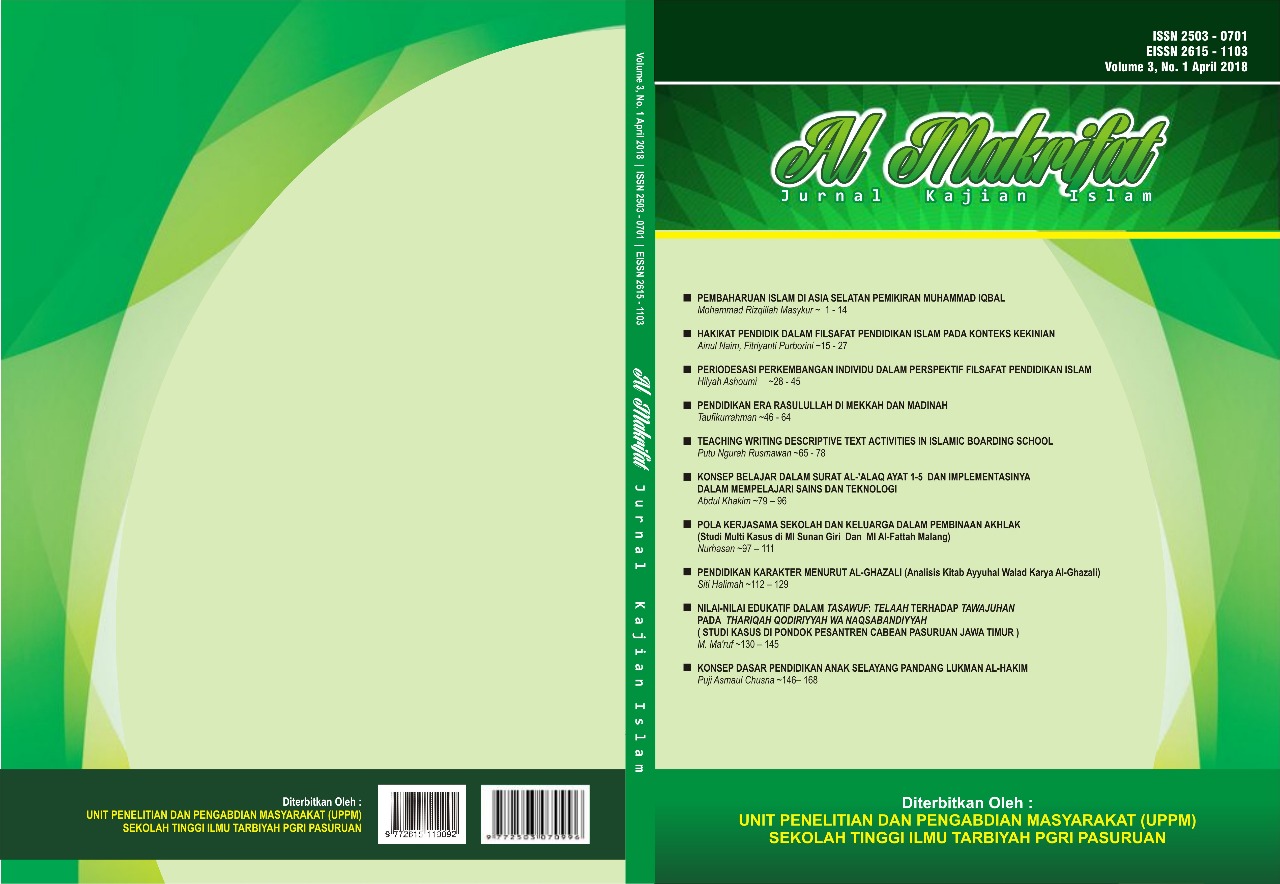Hakikat Pendidik Dalam Filsafat Pendidikan Islam Pada Konteks Kekinian
Abstract
Islam holds that human nature is the relationship between body and soul. View of the Quran about human focus on three important aspects that form the unity of man as a creature of God's glory, the man in his briefing to the origins and objectives to be achieved, human existence itself as a creature who has psychological benefits, as well as human as a social being associated with each other and other creatures around it. The fact of the educator in relation to Islamic education is to educate and teach them at the same time in accordance with its scholarly. Educators in the present context discusses the factors that affect the personality of the shifting moral educator. What about these solutions. The aim of this study is how the concept of Islamic education teachers in the philosophy that discusses the factors that affect the personality of educators shift today. This study used the research literature (Library Research), the research data collection by compiling data from various literature. In this study, researchers examined data from primary sources, especially several books on the concept of educators, human, and philosophy of Islamic education. In addition to primary sources, secondary sources are also used as support material such as journals. And the results of research the factors that led to the teacher's personality is less alive today, among other things: 1) The process of recruitment of teachers menegdepankan technical skills (hard skills) without regard to the non-technical skills (soft skills). 2) Education and training of teachers that emphasizes teachers' abilities to master the curriculum. 3) Do not understand the teaching profession as a professional vocation (call to teach).References
Abdurrahman Al-Nahlawi, Tarbiyah Al Islamiyah wa Asalibuha fi al Bayt wa Al Madrasah Wa Al Mujtama’ (Darnaskus: Dar Al Fikr, 1979), 54.
Abidin, Zainal. Filsafat Manusia. Bandung: Remaja Rosda Karya, 2014.
Agus Wibowo dan Hamrin,M. Menjadi Guru Berkarakter, (Strategi Membangun Kompetensi
dan Karakter Guru). Yogyakarta: Pustaka Pelajar,2012.
Ahmad Zamroni, Filsafat Pendidikan Islam, https://ceritakuaja.wordpress.com/2016/06/29/filsafat-pendidikan-islam/.
Ali, Muhammad. Hakikat Pendidik Dalam Pendidikan Islam.“Jurnal Tarbawiyahâ€Volume 11Nomor 1 Edisi Januari-Juli 2014.
Hadi, Sutrisno. Metodologi Research. Yogyakarta: Andi Offset, 2000.
Ihsan dan A Fuad Ihsan, Hamdani.Filsafat Pendidikan Islam. Bandung: Pustaka Setia, 1998.
Izzan dan Saehuddin, Ahmad.Tafsir Pendidikan Studi Ayat-Ayat Berdimensi Pendidikan. Banten: Pam Press, 2012.
Kosim, Mohammad. Guru Dalam Perspektif Islam, “Tadris†Volume 3. Nomor 1. 2008.
M. Ramli. “Hakikat Pendidik dan Peserta Didikâ€.Jurnal Tarbiyah Islamiyah.ISSN : 2088-4095Volume 5, Nomor 1, Januari-Juni 2015.
Maksum, Ali. Pengantar Filsafat: Dari Masa Klasik hingga Postmodernisme. Jogjakarta: Arruz Media, 2012.
Nata, Abuddin. Perspektif Islam Tentang Pola Hubungan Guru dan Murid. Jakarta: Rajawali Press, 2001.
Nizar, Samsul. Filsafat Pendidikan Islam. Jakarta: Ciputat Pers, 2002.
Q.S. At-Tahrim: 6.
Suharto, Toto. Filsafat Pendidikan Islam. Yogyakarta: Ar-Ruzz Media, 2011.
Umar, Bukhari. Ilmu Pendidikan Islam. Jakarta: Amzah, 2010.




